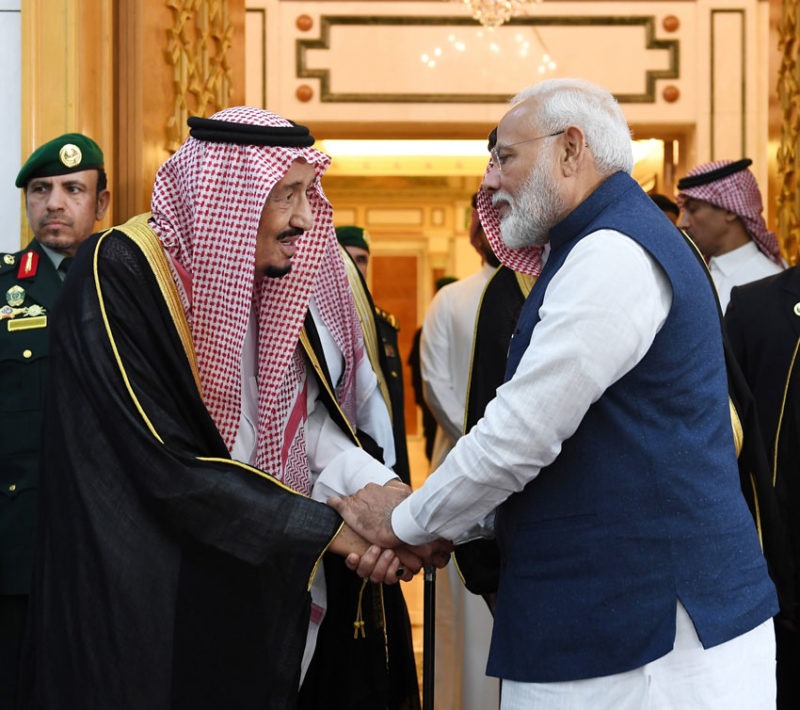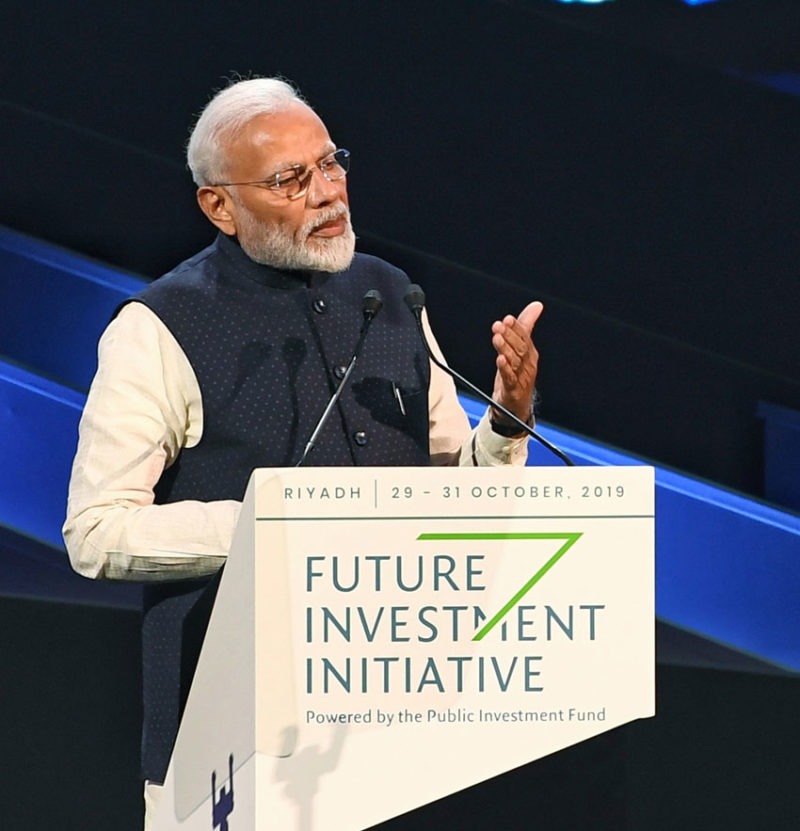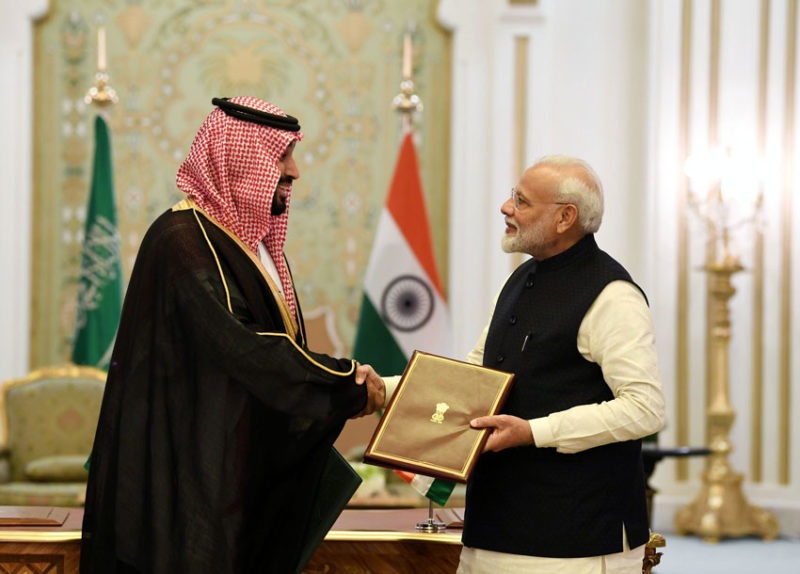Modi’s Brief Sojourn in “Davos in the Desert” Pays Dividends – Dramatic Evolution of Indo-Saudi Arabian Relations
Indian Prime Minister Narendra Modi and the Crown Prince of Saudi Arabia, Mohammed bin Salman Al Saud (l) exchanging the Strategic Partnership Council Agreement, in Riyadh, Saudi Arabia, Oct. 29. (PIB)
Prime Minister Narendra Modi is back from his brief visit of the Saudi Arabia (SA) on the personal invitation of Crown Prince Mohammad bin Salman, popularly known as MbS, to attend and deliver the keynote address of the Future Investment Initiative (FII) organized by Public Investment Fund, writes Priyanka Bhardwaj.
Famously described as the Davos in the Desert, the third chapter of the FII dated October 29 to 31, 2019 at Riyadh was to project SA as a dynamic investment destination.
The nickname comes from the flagship event of the World Economic Forum, the invitation-only annual meeting that brings together world businessmen, investors, policy makers, media representatives and academic experts to discuss current global socio-economic issues and shape agendas for pressing international concerns, in the small ski town of Switzerland, in the month of January.
The high profile FII summit was similarly attended by five presidents, heads of global banks, sovereign wealth funds and weapons makers, and speakers such as David Cameroon and Jared Kushner, son-in-law and adviser of US President Donald Trump, on “What Next for the U.S.”, with the Blackstone CEO Stephen Schwarzman as the moderator, besides Modi who pitched for inward investments in the energy sector and surety of “political stability, predictable policy, and big diverse market”, along with drawing attention to primacy for a balanced approach for conflict resolution in West Asia, bereft of “interference of ‘powerful’ countries that have tended to misuse United Nations as a ‘tool’.”

The Riyadh conference is commensurate with MbS’ new economic model and “Vision 2030” plans that speaks of an updated appraisal, enlisting of a cache of non-energy based green-field megaprojects, acquisition of overseas assets, attracting new partnerships and global financial interests to the pending IPO of state run Saudi Aramco, and heralding fresh social reforms, although accompanied with much suspicion and criticism, overtaking competing Islamic states, Turkey and Iran riddled with deeply entrenched and frozen structures and processes.
To India the potential advent of a more balanced geo-economic-religio-political scenario in West Asia, mean well and the last few years, Indo-Saudi Arabian Chapter is replete with higher frequency of visits of Modi, MbS and other higher officials, that have enabled bilateral concerns to translate into gainful connections, especially in trade that is stated to rise further from $27.48 billion (2017-18).
In the area of energy, even as SA is in the throes of a second economic recession and came under recent terror attacks on Abqaiq, and the Khurais oil oilfields that knocked down over 5% of world oil production, raising doubts of major spike in oil prices, its guarantee of continued oil supply to India, an importer 18% of crude oil and 30% of its liquefied petroleum gas needs from the kingdom, was a huge relief for New Delhi, and the recent Modi-visit saw the conclusion of a bilateral deal for a strategic 4.6 million crude reserve at Padur, Karnataka.
Earlier in the year the trilateral partnership between Saudi Aramco, Abu Dhabi National Oil Co and a consortium of Indian oil majors has on track the establishment of world’s largest green-field refinery in Raigarh that would upgrade refining India’s capacity by 77% to 8.8 million bpd by 2030 and provide SA an assured outlet for its crude.

Further there are expectations of the kingdom picking up stake in India’s Bharat Petroleum Corp refinery and petrochemical and refining business of Reliance Industries Limited.
The high point of the visit was the achievement of “Strategic Partnership Council” that would coordinate relations with SA in key areas, rolling out of RuPay card system, integration of India’s e-Migrate portal with the Saudi e-Thawtheeq system, other than a raft of agreements spanning defense, security, air services, renewable energy, medicine products regulation and prevention of narcotics trafficking.
Bringing reciprocity to the relationship is India’s notable improvement, by 14 places to 63rd rank, on World Banks’ Ease of Doing Business Index, that matches with its recent reforms and goal of a $5 trillion economy by 2025.
The evolution of a new era of a strategic Indo-Saudi relationship going beyond New Delhi’s “buyer of energy products and an exporter of 2.6 million human resource” traditional engagement emanate from its substantial outreaching to SA that bears in mind aspirations and expectations of India, without hindrance from the Pakistan factor impinging on its deepening association with India, at a time when Islamabad is leaving no stone unturned in its bid to internationalize the Kashmir issue following India’s revocation of Article 370, and Modi development of a close personal association with the de facto ruler, MbS, as with the UAE Ruler Mohammad Bin Rashid Al Maktoum, are the successes of the oft termed “Hindu nationalist” Modi-led government’s West Asian diplomacy and realpolitik.


